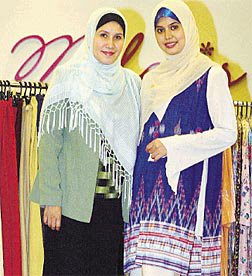 The rule for modesty applies to men as well as to women. The Prophet Muhammad s.a.w said that the first look is permissible. Consequent looks are forbidden. This means that one is not permitted to stare or to consume in vision the person before him or her.
The rule for modesty applies to men as well as to women. The Prophet Muhammad s.a.w said that the first look is permissible. Consequent looks are forbidden. This means that one is not permitted to stare or to consume in vision the person before him or her.The concept of dress in Islam also arises out of various verses stipulated in the Qur’an. These too reflect a state of moderation and modesty. It takes into account the created state of a woman in comparison to a man, thus the need not to attract undue attention to herself, which would naturally if she wore tight fitting or revealing apparel. This is intended to protect her and to give her honour and dignity.
However, it is a misconception to believe that Islam requires a person to be veiled or to go around totally in black.
The state of prayer which establishes the highest state of dignity in the presence of Allah s.w.t, allows for the face and hands to be uncovered.
Allah s.w.t says:
1. O Children of Adam! We have bestowed raiment upon you to cover your shame as well as to be adornment to you. But the raiment of righteousness – that is the best. Such are among the signs of Allah, that they may receive admonition!
2. O you Children of Adam! let not Satan [Syaitan] seduce you in the same manner as He got your Parents out of the garden, stripping them of their raiment, to expose their shame; for he and his tribe watch you from a position where you cannot see them; We made the Evil Ones friends [only] to those without faith. [Surah A’raf 7:26-27]
2. O Children of Adam! Wear your beautiful apparel at every time and place of prayer; eat and drink; but waste not by excess, for Allah s.w.t loves not the wasters. [Surah A’raf 7:31]
3. Allah s.w.t. will admit those who believe and work righteous deeds to gardens beneath which rivers flow; they shall be adorned therein with bracelets of gold and pearls; and their garments there will be of silk.
[Surah Hajj 22:23]
4. And tell the believing women to lower their gaze and be modest and to display of their ornaments only that which is apparent, and to draw their veils over their bosoms and not to display their beauty except to their husbands, their fathers, their husbands’ fathers, their sons, their husbands’s son , their brothers or theirs brothers’ sons, or their sisters’s son, or their women, or the slaves whom their right hands possess, or male servants free from physical needs, or small children who have no sense of the shame of sex; and that they should not strike their feet so as to reveal what is in their inner garments.[Surah Nur 24:31]
5. O you who believe, let those whom your right hands possess, and the [children] among you who have not come of age ask your permission [before they come to your presence] on three occasions; before morning prayer; while you put on clothes for the noonday heat; and after the late night prayer; these are your three times of undress; outside these times it is not wrong for you or for them to move about attending to each other…
[Surah Nur 25:58]
6. But when the children among you come of age, let them ask for permission, as do those senior to them [in age]… [Surah Nur 24:59]
7. Such elderly women as are past the prospect of marriage – there is not blame on them if they lay aside their [outer] garments, provided they make no a wanton display of their beauty; but it best for them to be modest; and Allah is One who sees and knows all things. [Surah Nur 24:60]
8. Upon them will be green garments of fine silk and heavy brocade. And they will be adorned with bracelets of silver; and their Lord will give them to drink of a wine, pure, and holy. [Surah Insan 76:21]
It is obvious that Muslim women are required to wear loose fitting garments. Except for the face and hands, all other parts are to be covered.
And Muslims are indeed required to dress well especially for prayers.
No comments:
Post a Comment